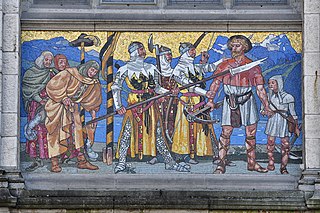
William Tell is a folk hero of Switzerland. According to the legend, Tell was an expert mountain climber and marksman with a crossbow who assassinated Albrecht Gessler, a tyrannical reeve of the Austrian dukes of the House of Habsburg positioned in Altdorf, in the canton of Uri. Tell's defiance and tyrannicide encouraged the population to open rebellion and a pact against the foreign rulers with neighbouring Schwyz and Unterwalden, marking the foundation of the Swiss Confederacy. Tell was considered the father of the Swiss Confederacy.

Lord Emsworth and Others is a collection of nine short stories by P. G. Wodehouse, first published in the United Kingdom on 19 March 1937 by Herbert Jenkins, London; it was not published in the United States. The Crime Wave at Blandings, which was published on 25 June 1937 by Doubleday, Doran, New York, is a very different collection, sharing only three of its seven titles with the UK book. Penguin Books published a UK edition of The Crime Wave at Blandings in 1966. The stories in both books had all previously appeared in both British and American magazines.

Blandings Castle and Elsewhere is a collection of short stories by P. G. Wodehouse. It was first published in the United Kingdom on 12 April 1935 by Herbert Jenkins, London, and, as Blandings Castle, in the United States on 20 September 1935 by Doubleday Doran, New York. All the stories had previously appeared in Strand Magazine (UK) and all except the last in various US magazines.

Nothing Serious is a collection of ten short stories by P. G. Wodehouse. It was first published in the United Kingdom on 21 July 1950 by Herbert Jenkins, London, and in the United States on 24 May 1951 by Doubleday & Co., New York. It was published again in 2008 by The Overlook Press.
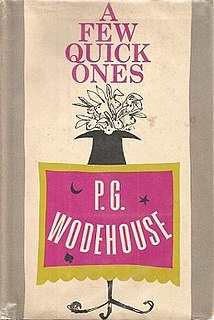
A Few Quick Ones is a collection of ten short stories by P. G. Wodehouse. It was first published in the United States on 13 April 1959 by Simon & Schuster, New York, and in the United Kingdom on 26 June 1959 by Herbert Jenkins, London. The first US edition dust jacket was designed by Paul Bacon. The book's title comes from the informal phrase "a quick one", which is British slang for an alcoholic drink consumed quickly.

Eggs, Beans and Crumpets is a collection of short stories by P. G. Wodehouse, first published in the United Kingdom on April 26, 1940 by Herbert Jenkins, London, then with a slightly different content in the United States on May 10, 1940 by Doubleday, Doran, New York.

"Jeeves Takes Charge" is a short story by P. G. Wodehouse, and features the young gentleman Bertie Wooster and his valet Jeeves. The story was published in the Saturday Evening Post in the United States in November 1916, and in The Strand Magazine in the United Kingdom in April 1923. The story was also included in the 1925 collection Carry On, Jeeves.

"Jeeves in the Springtime" is a short story by P. G. Wodehouse, and features the young gentleman Bertie Wooster and his valet Jeeves. The story was published in The Strand Magazine in December 1921 in London, and in Cosmopolitan in New York that same month. The story was also included in the 1923 collection The Inimitable Jeeves as two separate chapters, "Jeeves Exerts the Old Cerebellum" and "No Wedding Bells for Bingo".

Albrecht Gessler, also known as Hermann, was a legendary 14th-century Habsburg bailiff at Altdorf, whose brutal rule led to the William Tell rebellion and the eventual independence of the Old Swiss Confederacy.

Mr Mulliner Speaking is a collection of nine short stories by P. G. Wodehouse. It was first published in the United Kingdom on April 30, 1929 by Herbert Jenkins, and in the United States on February 21, 1930 by Doubleday, Doran. The stories were originally published in magazines in the UK and the US between 1924 and 1929.

William Tell is a drama written by Friedrich Schiller in 1804. The story focuses on the legendary Swiss marksman William Tell as part of the greater Swiss struggle for independence from the Habsburg Empire in the early 14th century. Gioachino Rossini's four-act opera Guillaume Tell was written to a French adaptation of Schiller's play.
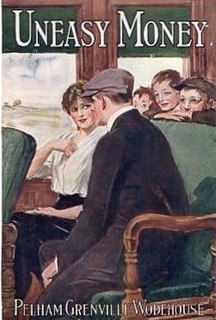
Uneasy Money is a novel by P. G. Wodehouse, first published in the United States on 17 March 1916 by D. Appleton & Company, New York, and in the United Kingdom on 4 October 1917 by Methuen & Co., London. The story had earlier been serialised in the U.S in the Saturday Evening Post from December 1915, and in the UK in the Strand Magazine starting December 1916.
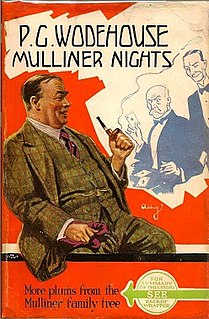
Mulliner Nights is a collection of short stories by P. G. Wodehouse. First published in the United Kingdom on 17 January 1933 by Herbert Jenkins, and in the United States on 15 February 1933 by Doubleday, Doran. The stories in the collection were originally published in magazines in the UK and the US between 1930 and 1932.

Young Men in Spats is a collection of short stories by P. G. Wodehouse, first published in the United Kingdom on 3 April 1936 by Herbert Jenkins, London, then in the United States with a slightly different selection of stories on 24 July 1936 by Doubleday, Doran, New York.
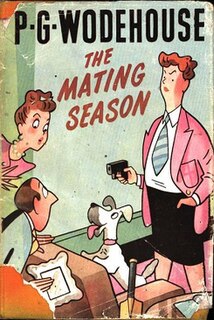
The Mating Season is a novel by P. G. Wodehouse, first published in the United Kingdom on 9 September 1949 by Herbert Jenkins, London, and in the United States on November 29, 1949, by Didier & Co., New York.
"The Crime Wave at Blandings" is a short story by P. G. Wodehouse that first appeared in the United States in two parts, in the October 10 and October 17, 1936 editions of the Saturday Evening Post, and in the United Kingdom in the January 1937 issue of the Strand. It was included in the collection Lord Emsworth and Others (1937), and provided the title to the U.S. equivalent of that collection.
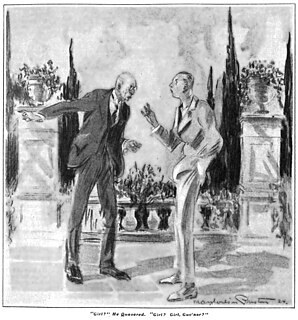
"The Custody of the Pumpkin" is a short story by British comic writer P. G. Wodehouse. It first appeared in the United States in the 29 November 1924 issue of The Saturday Evening Post, and in the United Kingdom in the December 1924 issue of Strand Magazine. Part of the Blandings Castle canon, it features the absent-minded peer Lord Emsworth, and was included in the collection Blandings Castle and Elsewhere (1935), although the story takes place sometime between the events of Leave it to Psmith (1923) and Summer Lightning (1929).
"Pig-Hoo-o-o-o-ey" is a short story by P. G. Wodehouse, which first appeared in the United States in the 9 July 1927 issue of Liberty, and in the United Kingdom in the August 1927 Strand. Part of the Blandings Castle canon, it features the absent-minded peer Lord Emsworth, and was included in the collection Blandings Castle and Elsewhere (1935), although the story takes place sometime between the events of Leave It to Psmith (1923) and Summer Lightning (1929).
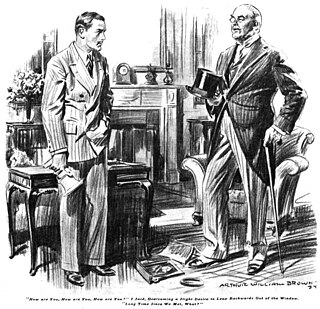
"The Rummy Affair of Old Biffy" is a short story by P. G. Wodehouse, and features the young gentleman Bertie Wooster and his valet Jeeves. The story was published in the Saturday Evening Post in the United States in September 1924, and in The Strand Magazine in the United Kingdom in October 1924. The story was also included in the 1925 collection Carry On, Jeeves.
"Jeeves and the Song of Songs" is a short story by P. G. Wodehouse, and features the young gentleman Bertie Wooster and his valet Jeeves. The story was published in The Strand Magazine in the United Kingdom in September 1929, and in Cosmopolitan in the United States that same month. The story was also included as the fourth story in the 1930 collection Very Good, Jeeves.

















